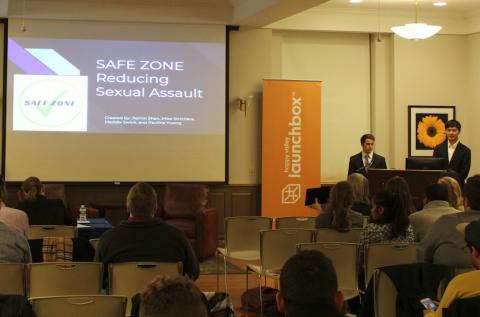
This fall, undergraduate students are working together in cross-college teams to develop original mobile health prototypes that address societal health needs associated with specific target audiences. This year’s teams are developing apps to lessen the stress of pediatric hospital patients, ensure healthy eating habits, improve sleep routines, assist with medication reminders, monitor opioids in the bloodstream, and broaden the abilities of smart smoke alarm systems to alert families to health-threatening situations, among a host of other issues.
Offered during Penn State’s Global Entrepreneurship Week, the mHealth Challenge involves students from the College of Nursing and the Department of Biobehavioral Health (BBH) in the College of Health and Human Development (HHD), who collaborate with students in the College of Information Sciences and Technology (IST) enrolled in the class, “Technologies for Digital Entrepreneurs.”
“The mHealth Challenge is an exciting opportunity for students to get hands-on experience in app development, team work, and creative thinking about ways to manage and perhaps even resolve health issues facing the world today,” said Meg Small, Social Innovation Director at the Edna Bennett Pierce Prevention Research Center, and a co-developer of the challenge. “Through the challenge, students have real-time opportunities to apply their off-site experiences in internships or clinical rotations, into the classroom and collaborations that require the sorts of multi-perspective conversations with peers important to professional life after college.”
Students from the IST class act as technology consultants to the students from BBH/HHD and nursing, in creating ideas for their application, which needs to be tailored to a specific audience and must address a societal need. Ideas from past years include a pain management application and an application to help veterans cope with PTSD, among others. The format follows that of a technology-consulting firm, with biobehavioral health and health services students creating the idea and content, while IST students bring the application to life.
The competition spans over the course of a month, beginning with preliminary rounds at Happy Valley Launchbox. Competitors have until Nov. 11 to prepare for the semi-finals, with the opportunity to continue to the final round on Nov. 12. The final round will take place at 6 p.m. on Nov. 12 in 22 Biobehavioral Building, during Global Entrepreneurship Week. The event is open to the public — all are welcome to attend.
“The fact that students are being exposed to entrepreneurial thinking and the idea of aligning concepts in an interdisciplinary fashion is a true takeaway from the challenge,” said Lee Erickson, the other co-founder of the challenge, and chief amplifier at Happy Valley Launchbox. “A lot of young people think entrepreneurship is this big idea, but it isn’t. Through mHealth it is important that we start to create this ecosystem among students that fosters an entrepreneurial spirit that they can carry into their careers.”
Students prepare their pitch to present first to a panel of Penn State faculty from IST, BBH/HHD, and nursing. The finals judges are individuals selected from among the prominent figures in the technology and health fields, and often are Penn State alums who have gained significant real-world entrepreneurial experience. Previous winners of the competition have been offered internships in Silicon Valley after presenting their pitch to the panel.
Last year’s winning team created a “Safe Zone App,” which was an interactive application designed to reduce incidences of sexual assault on college campuses. The runner-up created an application to aid the lactose-intolerant in making safe food choices.
For more information about Penn State’s Global Entrepreneurship Week, and the mHealth Challenge, visit https://gew.psu.edu/.